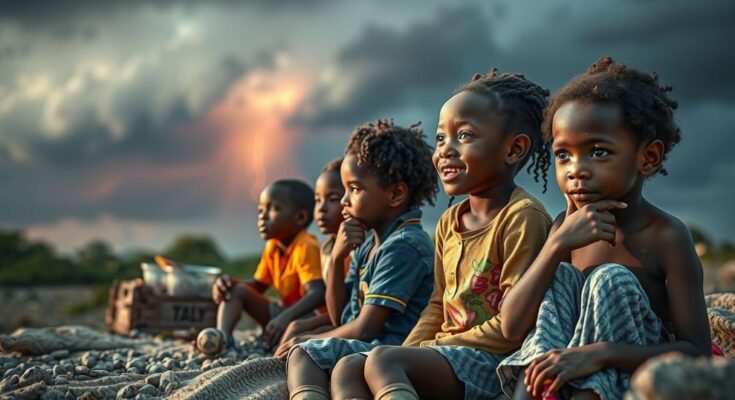Tropical Cyclone Dikeledi threatens Northern Madagascar, where over 22,500 children face displacement and potential hazards due to severe weather. Save the Children is mobilizing resources for immediate relief while advocating for increased climate funding to assist vulnerable regions impacted by climate change.
Over 22,500 children in Northern Madagascar face the impending threat of Tropical Cyclone Dikeledi, which is anticipated to make landfall with potentially catastrophic consequences. Families are urged to evacuate as meteorological forecasts predict strong winds, heavy rainfall, and significant storm surges beginning January 11. Previous storms, such as Tropical Storm Chido, have left lasting scars in the region, and Save the Children has expressed grave concerns for the safety and well-being of vulnerable populations.
The meteorological department has reported that heavy rainfall has already begun affecting Northern Madagascar, with conditions expected to worsen in the upcoming days. Save the Children highlights that such extreme weather events, exacerbated by climate change, have become increasingly frequent and have led to urgent calls for increased financial assistance from wealthier nations for climate mitigation efforts in lower-income nations.
Tatiana Dasys, Save the Children’s Country Representative for Madagascar, has emphasized the immediate threats posed by Cyclone Dikeledi, stating, “We are extremely concerned that more than 22,500 children living in areas expected to be hit by the cyclone are at risk of being displaced, losing their homes, school, and possibly being injured or killed by falling objects or floods.” The organization is mobilizing resources and has prepared its operations to support the affected communities, particularly in terms of assessment and aid distribution.
In anticipation of the cyclone’s impact, Save the Children has positioned vital resources in the Sava region and enhanced local preparedness efforts, particularly within schools, to ensure communities are equipped to handle the influx of severe weather. The organization urges immediate action for humanitarian aid to prevent loss of life and help protect the most vulnerable in this imminent crisis.
Since commencing its operations in Madagascar in 2016, Save the Children has developed expertise in several critical areas, including child protection and disaster response. The organization aims to continue providing relief and assistance, having already reached over 12,700 children through its various programs aimed at supporting families in times of crisis.
Tropical Cyclone Dikeledi poses a significant threat to Northern Madagascar, where rising instances of extreme weather due to climate change have led to increased vulnerability among populations, especially children. In light of previous storms, the need for emergency preparedness and climate resilience initiatives has never been more urgent. Save the Children’s on-the-ground efforts in Madagascar are focused on providing immediate assistance and long-term support to mitigate the impacts of such disasters on affected communities.
In conclusion, as Tropical Cyclone Dikeledi approaches Northern Madagascar, the risks to over 22,500 children and their families are substantial. Save the Children is poised to respond with humanitarian aid and support, highlighting the need for increased climate funding to bolster resilience in vulnerable regions. The exacerbation of extreme weather events necessitates urgent action from the international community to protect those most at risk from the hazards posed by climate change.
Original Source: www.africa.com




